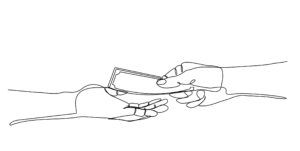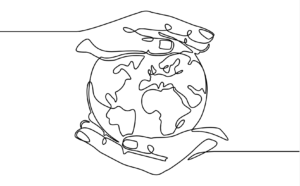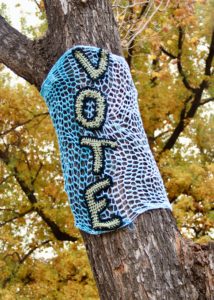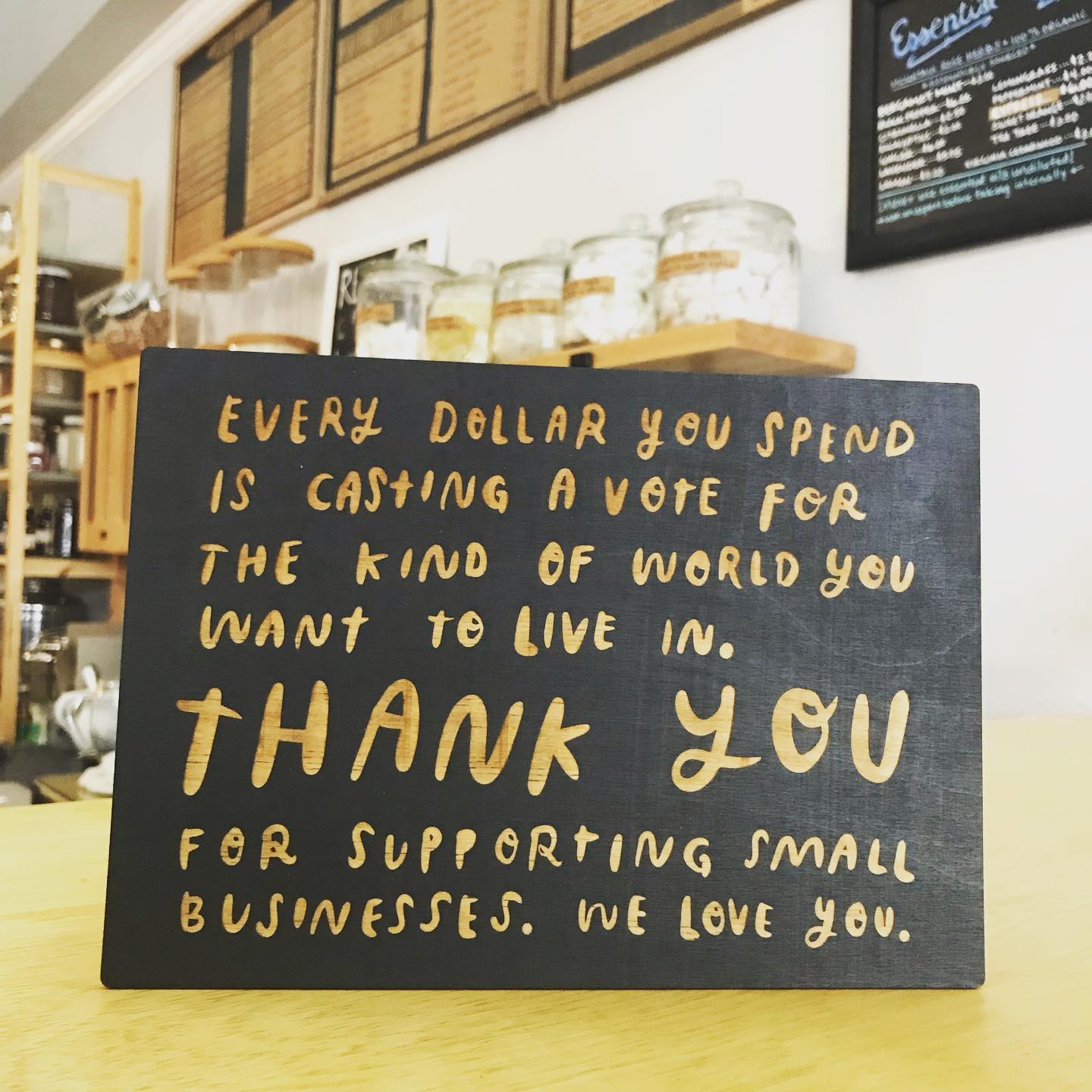Heading to the voting booth to cast our ballot each year is an important political civic action. Those collective choices shape government policy, which has the power to bring about considerable change to the society we encompass.
But today I want to talk about a different type of vote. Because whether or not you bubbled in your ballot, you are voting this November. In fact, we’re all voting every single day, without realizing it.
 You vote for the world you want to live in whenever and wherever you spend money.
You vote for the world you want to live in whenever and wherever you spend money.
Why? Every purchase you make supports the organization you’re buying from. To that end, every purchase you choose NOT to make can be an effective signal that you, a consumer with a monetary vote, have found an alternative that you prefer, for one reason or another (even if it means not buying anything at all!).
It may seem insignificant – after all, what’s one more Amazon order?
To multinational corporations or fast fashion conglomerates, perhaps it IS insignificant. But – every time you DON’T choose the giant corp and you buy local produce, thrifted clothing, or refill your containers at your local refillery (a-hem), it means absolutely everything!
Do my small purchases really make a difference?
The short answer: YES!
For better or worse, your purchase supports the company and people who are working for that cause. It helps them keep going, perpetuating the values and standards that company shares with the world.
And collectively, these consumption choices yield great power!
If you need a little more convincing, take a look at some of these examples where the consumers shifted the balance of power and took matters into their own hands.
- The 1791 English Sugar Boycott
One of the first known examples of a boycott, 1791 English citizens who opposed slavery took it upon themselves to boycott sugar produced by slaves in the West Indies. Many of the political leaders had stakes in the sugar industry. After sales dropped by 30%, political campaigns and policy reform began to ramp up in earnest.
It took several years, but the sugar boycott is credited with being a driving force of abolishing slavery in England. It may seem like large corporations are impenetrable, but reducing their purchases by only one-third was enough to create sweeping legislative change for the entire nation.
- 2010 Nestlé Palm Oil Boycott
A much more recent example is the 2010 Nestlé boycott over unsustainable palm oil. Palm oil production created rampant deforestation across Indonesia and beyond. To stop the devastating effects, Greenpeace organized a boycott campaign.
It only took 8 weeks of pressure by consumers for Nestlé to change its tune. They quickly released a new policy promising zero deforestation in their palm oil supply chain.
- 2019 Chick-fil-A Donations
After some online backlash regarding anti-LGBTQ donations hit the internet in 2012, Chick-fil-A made a few changes, but did not completely stop the donations in question. When consumers stepped in again and initiated a boycott in 2019, the company formally changed their donation policy to focus on education, homelessness, and hunger, officially ending those anti-LGBTQ donations.
🟔 Note: I’m not necessarily saying these companies are now doing everything right, but they make for good examples of how your dollar CAN make a difference. 🟔
 How can you determine what companies deserve your vote?
How can you determine what companies deserve your vote?
As a conscious consumer you know how to reduce, reuse, refill, and rethink, but sometimes it can be time to buy something new.
You’re smart, so I’m sure you can tell when a company is obviously not good to purchase from. Triple-wrapped in plastic? Nah. No thanks. Costs one-third of what its competitors do? Probably not a good sign.
On the other hand, if it is clearly made with recycled materials, organic, or fair-trade, you can probably tell the company has some of your shared values.
Certifications are a good place to start, but it’s important to know whether (a) those certifications are reputable and (b) what they really mean.
Some trustworthy certifications:
-
Certified B Corporations – audited regularly to ensure high standards of social and environmental impacts. B Corps maintain a high level of sourcing and financial transparency within their business.
-
Rainforest Alliance – a certification for paper products, food and drinks, as well as tourism businesses. Pretty much any industry can have a negative impact on the rainforest, but the Rainforest Alliance Certification let’s you know they’re doing their part.
-
Green Seal – often found on paper products, it sometimes crops up in other places. Green Seal indicates that a company is not contributing to deforestation or other unsustainable practices.
-
Cradle to Cradle – focused mostly on textiles and home goods, Cradle to Cradle certifies companies that are committed to creating a circular economy.
-
LEED Certification – a designation for buildings that were constructed in a low-impact, socially conscious way, often with recycled materials.
- Leaping Bunny Certification – a way to identify cruelty-free cosmetics, personal care, and household cleaning supplies. Leaping Bunny is different from other third-party cruelty-free certifications because of their strict no animal testing standards, Supplier Monitoring System, and independent audits.
Some other certifications:
- 1% for the Planet – pretty much exactly what it sounds like, this designation indicates that a company donates 1% of its profits to eco-friendly efforts. While that is certainly something to be celebrated, and I know lots of brands doing this, realistically it tells you nothing about how the company actually conducts its sourcing and manufacturing. Just something to consider.
- Carbon Offsetting – if a company is carbon offsetting, it means they are donating to environmental projects that reduce carbon in our atmosphere. It’s helpful and very powerful when combined with strong efforts to reduce the carbon footprint of production, but some companies use it as an excuse to continue (or cover up) other harmful practices. Be sure to dig a little deeper.
- FSC Certification – a certification for paper products that is intended to reduce deforestation. It’s better to buy certified products than not, but some experts have questioned the effectiveness of the FSC, finding that audits aren’t thorough or often enough to truly protect the forest. Again, try to dig a little deeper and look for sourcing transparency.
- Energy Star – similar to the FSC, it’s better to have the certification than not. But the Energy Star logo simply means that a product is slightly more energy efficient than the current industry standard, and how much better varies from product to product. Consider doing a little more research before you buy.
 You have the purchasing power!
You have the purchasing power!
All this is not to make you feel guilty or overwhelmed, but rather empowered.
Your choices make a difference.
The choices of large corporations make a bigger difference – but you have the power to influence them with your own.
In the age of smartphones, it’s easier than ever to search for a company’s reputation before you make a purchase. And if you’re shopping online, that information is just one tab away.
This little bit of extra effort has a compounding effect. The more of us who consistently shop consciously, the greater the results.
As we head into the holidays, and particularly Black Friday weekend, I encourage you to think about your purchases as a way to support and perpetuate your values in our community.
Together we can drive lasting changes. 🤍
At Life Unplastic’s sustainable shop and refillery, you can shop confidently (and guilt-free!) knowing that I have personally vetted every brand we sell. Your purchases support normalizing low waste consumerism as opposed to throwaway culture and the people who are making that possible.
So thank you for supporting my small business that supports other small businesses. We love you!
